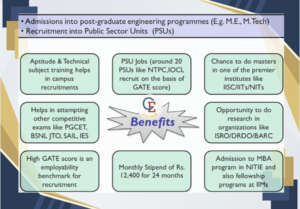Greetings, aspiring civil engineers! If you’re going up to give the Civil Engineering GATE Exam for 2024, you’re in the right place. As a civil engineer myself, I understand the importance of staying updated with the latest changes in the field. That’s why I’m thrilled to guide you through the newly revised Civil Engineering GATE Exam Syllabus for 2024. First things first, let’s briefly touch on what the GATE exam is all about. The Graduate Aptitude Test in Engineering (GATE) is a national-level examination conducted annually for admission to postgraduate programs in various prestigious institutions across India. It’s also used by many public sector undertakings (PSUs) for recruitment purposes.
Why Stay Updated?: Now, you might be wondering why it’s essential to stay updated with the GATE syllabus. Well, the field of civil engineering is constantly evolving, with new technologies, methodologies, and practices emerging all the time. By staying abreast of these changes, you’ll not only be better prepared for the exam but also equipped with the latest knowledge and skills needed to excel in your career. We will discuss everything in this blog “Civil Engineering GATE Exam Syllabus for 2024”.
Exploring the Updated Civil Engineering GATE Exam Syllabus for 2024
Integration of Interdisciplinary Concepts: Civil engineering is inherently interdisciplinary, often overlapping with other fields such as environmental engineering, geotechnical engineering, and transportation engineering. The updated syllabus acknowledges this by integrating interdisciplinary concepts and their applications in real-world scenarios.
Enhanced Problem-Solving Skills: In addition to theoretical knowledge, the revised syllabus emphasizes the development of critical thinking and problem-solving skills. Expect to encounter more practical and application-based questions that test your ability to analyze complex problems and propose innovative solutions.
Preparing for Success: Now that you’re familiar with the key changes in the 2024 GATE exam syllabus for civil engineering, it’s time to start preparing for success. Take advantage of resources such as textbooks, online courses, and mock tests to strengthen your understanding of the core concepts and stay updated with the latest developments in the field.
Remember, success in the GATE exam requires dedication, perseverance, and a solid understanding of the fundamentals. By staying informed and continuously honing your skills, you’ll be well on your way to achieving your academic and professional goals in the dynamic world of civil engineering.
Different Subjects in Civil Engineering Gate Exam 2024
Let’s explore the important subjects you’ll come across when you give the Civil Engineering GATE Exam for 2024. We’ll explore each one to understand what you need to know in Civil Engineering GATE Exam Syllabus for 2024.
Structural Engineering: Structural engineering forms the backbone of civil engineering, focusing on the design and analysis of various structures such as buildings, bridges, and dams. Topics covered in this subject include structural analysis, design of steel and concrete structures, structural dynamics, and earthquake engineering.
Geotechnical Engineering: Geotechnical engineering deals with the behavior of earth materials, including soil and rock, and their interaction with structures and the environment. Subjects covered in this area include soil mechanics, foundation engineering, slope stability, and retaining structures.
Environmental Engineering: Environmental engineering addresses the protection and preservation of natural resources and the environment. It encompasses topics such as water and wastewater treatment, air pollution control, solid waste management, environmental impact assessment, and sustainable development practices.
Transportation Engineering: Transportation engineering focuses on the planning, design, operation, and maintenance of transportation systems, including roads, railways, airports, and ports. Subjects covered include transportation planning, traffic engineering, pavement design, and public transportation systems.
Water Resources Engineering: Water resources engineering deals with the management, utilization, and conservation of water resources for various purposes, including irrigation, hydroelectric power generation, and flood control. Topics include hydrology, hydraulics, water supply systems, and hydraulic structures.
Construction Materials and Management: This subject covers the properties and behavior of construction materials such as concrete, steel, timber, and composites, as well as construction management principles, project planning, scheduling, and cost estimation.
Surveying: Surveying involves the measurement and mapping of land and other geographical features. It includes topics such as plane surveying, leveling, contouring, theodolite surveying, and GPS-based surveying techniques.
General Aptitude: In addition to the technical subjects, the GATE exam also includes a section on general aptitude, which assesses candidates’ verbal and numerical reasoning abilities, as well as their proficiency in English grammar and comprehension.
Subject wise weightage in gate for Civil Engineering 2024
Civil Engineering GATE Exam Syllabus for 2024 covers 15 sections, and the importance of each can vary yearly in the GATE exam. Subjects like Engineering Mathematics and General Aptitude are consistently important. Each section may carry around 15 marks, so focusing on high-scoring topics is crucial. Aspirants should plan their study schedule according to Civil Engineering GATE Exam Syllabus for 2024.
| Subjects | GATE 2015 | GATE 2016 | GATE 2017 | GATE 2018 | GATE 2019 | GATE 2020 | GATE 2021 | GATE 2022 | GATE 2023 |
| General Aptitude | 15% | 15% | 15% | 15% | 15% | 15% | 15% | 14% | 15% |
| Engineering Mathematics | 13% | 15% | 12.5% | 11.5% | 10.5% | 11.5% | 13% | 13% | 13% |
| Irrigation & Hydrology | 5% | 4% | 5.5% | 5% | 5.5% | 5.5% | 4% | 3% | 7% |
| Fluid Mechanics | 5% | 7% | 7.5% | 8.5% | 9% | 7.5% | 8% | 9% | 7% |
| Environmental Engineering | 8% | 10% | 11% | 10% | 9% | 11% | 11% | 10% | 11% |
| Structural Analysis | 4.5% | 3% | 6.5% | 1.5% | 4.5% | 6% | 6% | 8% | 5% |
| Geotechnical Engineering | 15% | 15% | 12.5% | 14% | 16% | 14.5% | 15% | 13% | 16% |
| Transportation Engineering | 7% | 6% | 8.5% | 9.5% | 9.5% | 11% | 9% | 7% | 6% |
| Geomatics Engineering | 6% | 5% | 4.5% | 4% | 6% | 14.5% | 5% | 8% | 4% |
| R.C.C. | 7% | 5% | 5% | 7% | 5% | 5% | 5% | 5% | 4% |
| Steel Structures | 5.5% | 3% | 2% | 4.5% | 5% | 2.5% | 3% | 2% | 3% |
| Construction Materials & Management | – | 5% | 3% | 0.5% | 1% | 0.5% | 1% | 3% | 0% |
| Engineering Mechanics | – | 3.5% | 1% | 3% | 0.5% | 1% | 0% | 1% | 1% |
| Solid Mechanics | 7% | 3.5% | 5.5% | 6% | 3.5% | 4% | 2% | 2% | 7% |
Origins of GATE
The story of GATE begins in the early 1980s when the Indian Institute of Science (IISc) and seven Indian Institutes of Technology (IITs) collaborated to establish a standardized examination for assessing the aptitude and technical knowledge of engineering graduates. Thus, GATE was born, with its inaugural examination conducted in 1984. The Updated Civil Engineering GATE Exam Syllabus for 2024 we already discussed here.
Significance of GATE: Over the years, GATE has evolved into one of the most esteemed examinations for engineering graduates in India. It serves as a gateway of multiple opportunities, including admission to postgraduate programs in prestigious institutions, recruitment by leading public sector undertakings (PSUs), and eligibility for lucrative scholarships and fellowships.
Scope After Clearing GATE: So, what lies beyond the realm of GATE? The scope is vast and diverse, offering a myriad of avenues for personal and professional growth. Here’s a glimpse of what awaits those who clear this esteemed examination:
Higher Education: One of the primary benefits of clearing GATE is the opportunity to pursue higher education in esteemed institutions across India and abroad. Top universities and colleges offer admission to their postgraduate programs in engineering, technology, and related fields based on GATE scores.
Research Opportunities: GATE opens doors to exciting research opportunities in cutting-edge fields of engineering and technology. Successful candidates can pursue doctoral studies or research fellowships in specialized areas, contributing to advancements in their chosen fields and shaping the future of technology.
Public Sector Undertakings (PSUs): Many leading PSUs in India, including Bharat Heavy Electricals Limited (BHEL), Oil and Natural Gas Corporation (ONGC), and National Thermal Power Corporation (NTPC), recruit engineering graduates through GATE scores. A high GATE score can significantly enhance your chances of securing a prestigious job in the public sector.
Scholarships and Fellowships: GATE qualifiers are eligible for various scholarships and fellowships offered by government agencies, research organizations, and corporate entities. These financial incentives not only support your academic pursuits but also recognize your exceptional talent and potential in the field of engineering.
So, if you’re ready to unlock the doors to a bright future, start your GATE journey today and seize the countless opportunities that await you! Wishing you all the best on your GATE journey!
Feel free to follow us there on Instagram and drop a comment to say hello!



